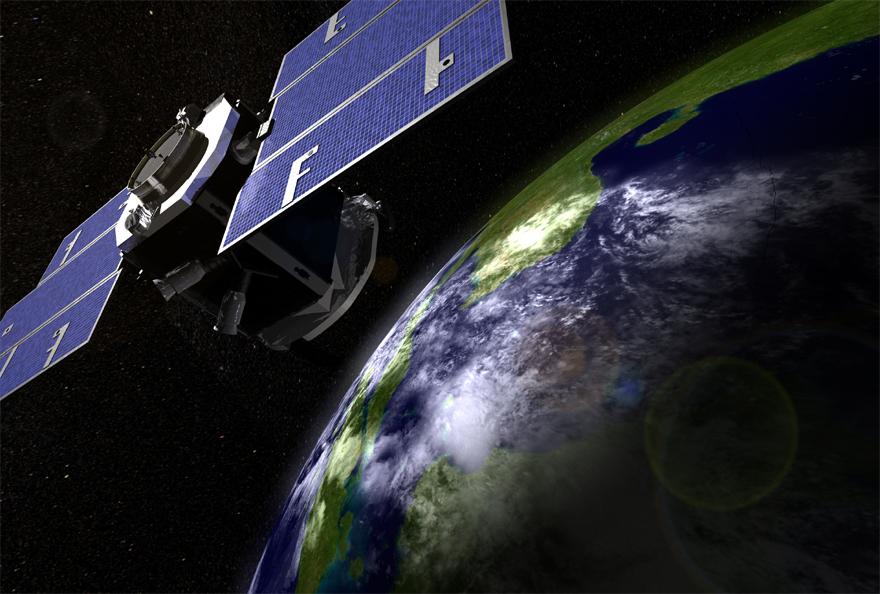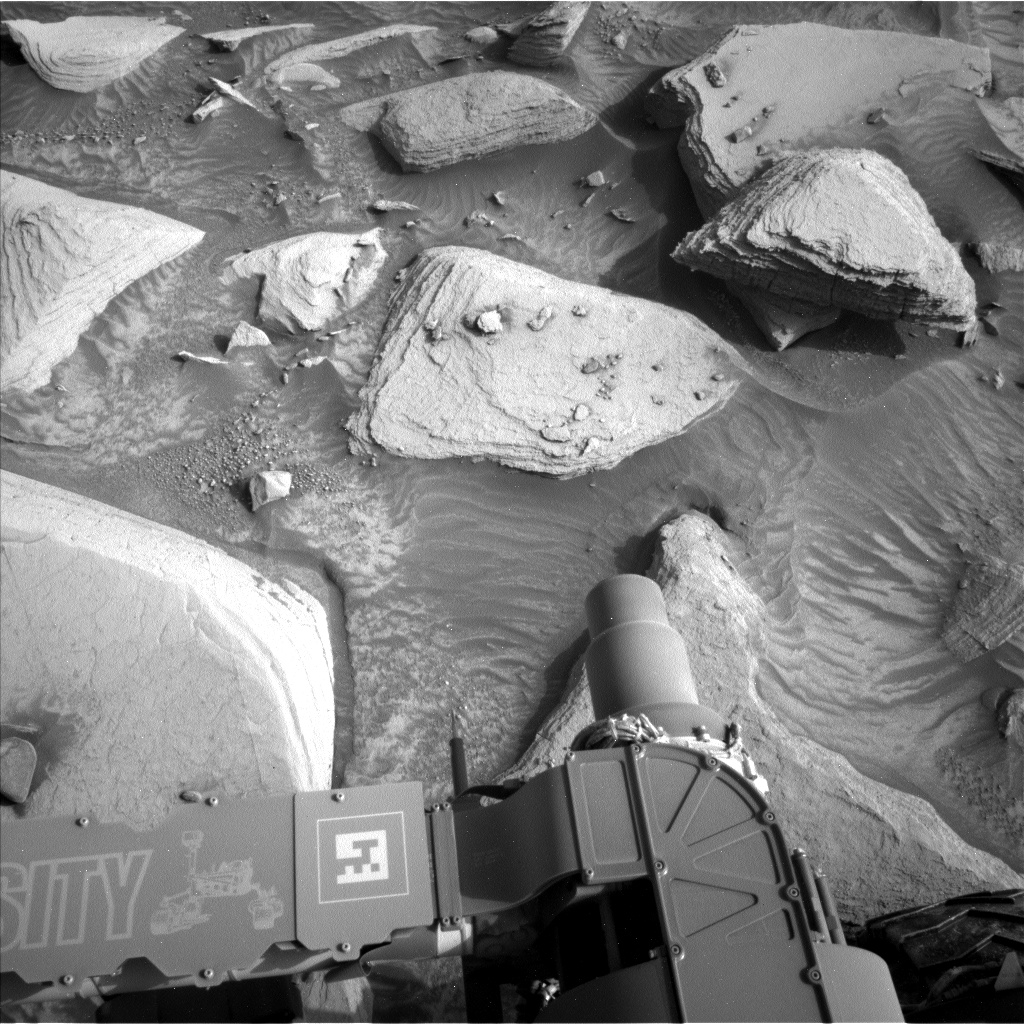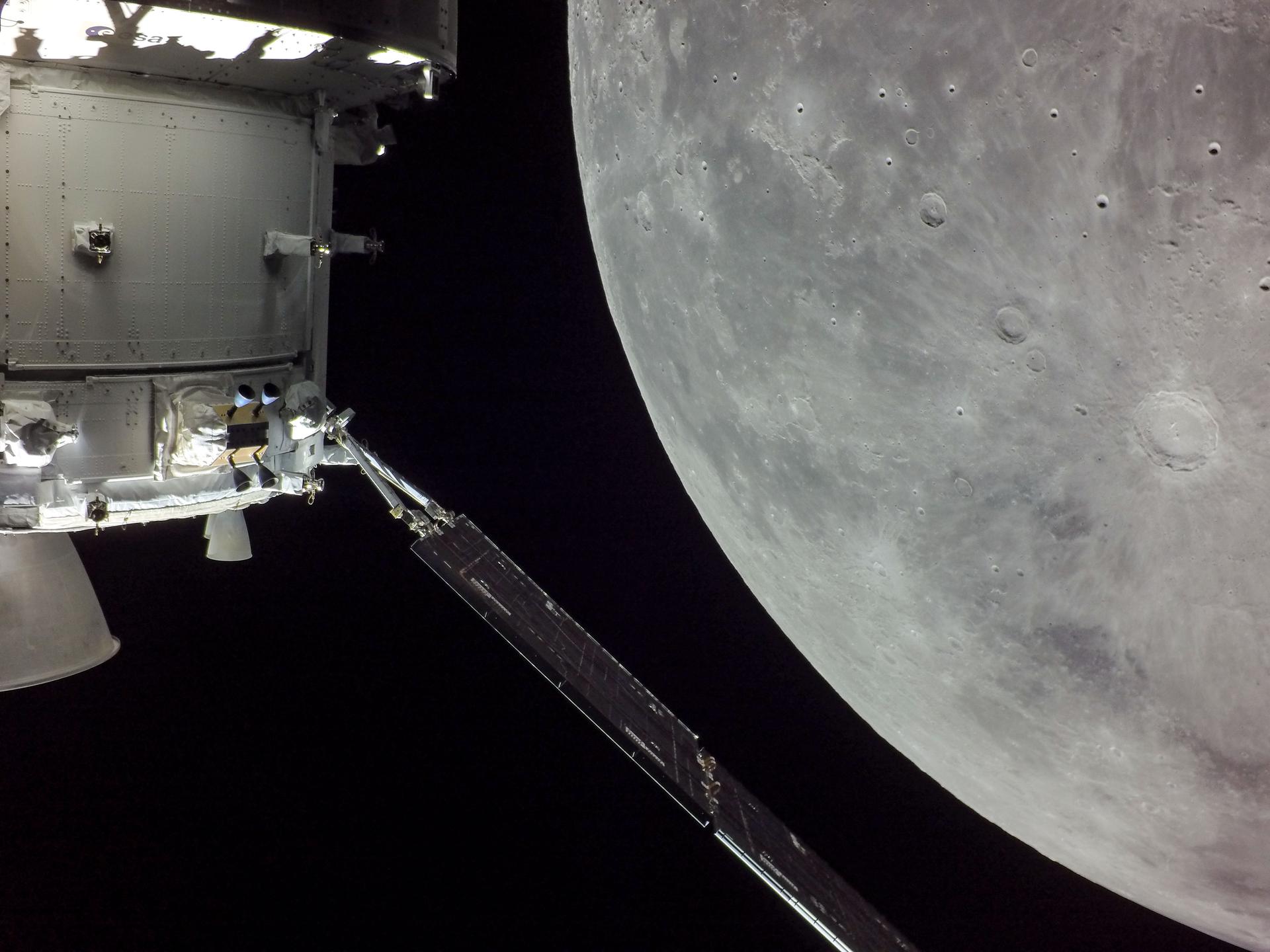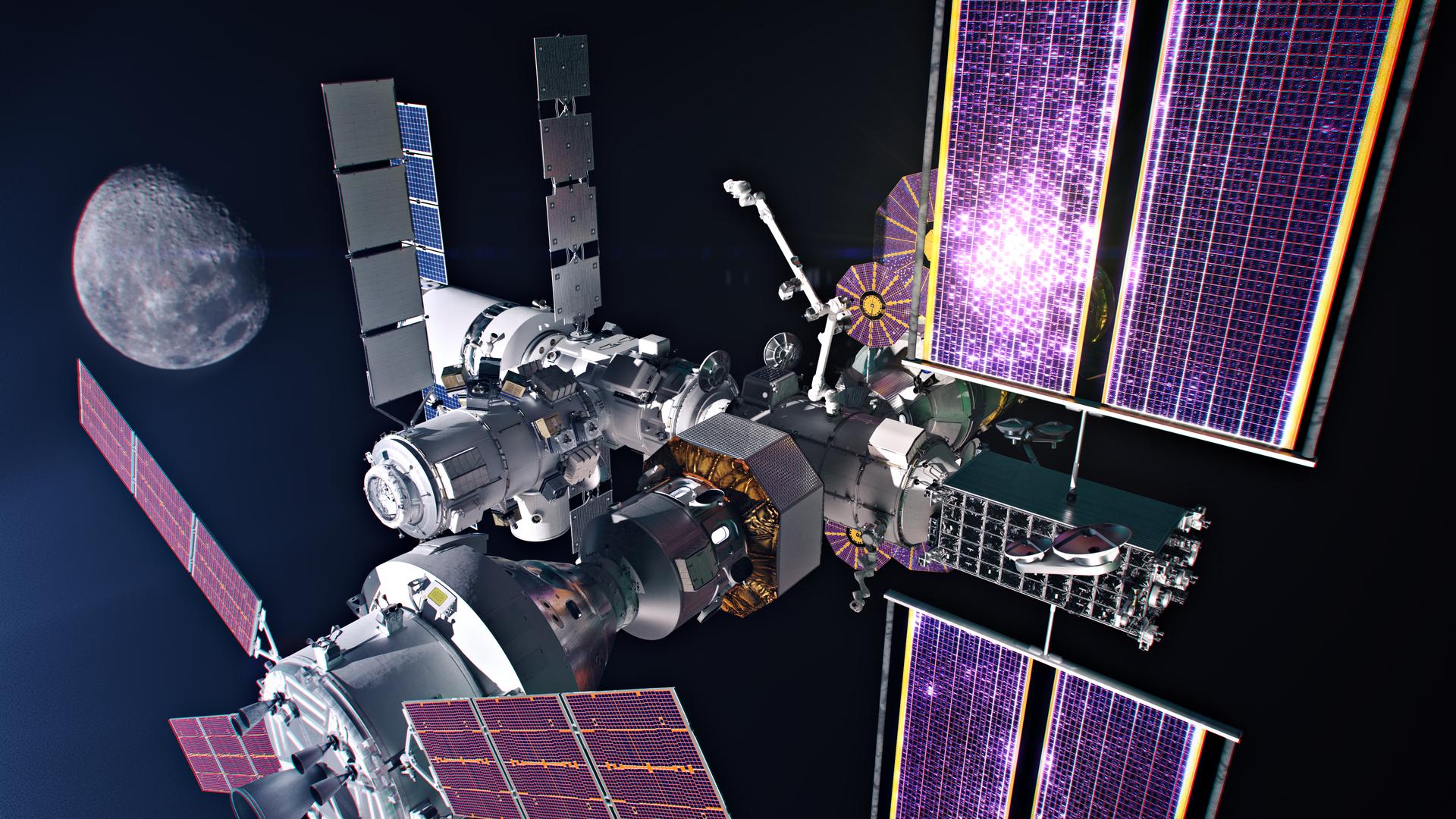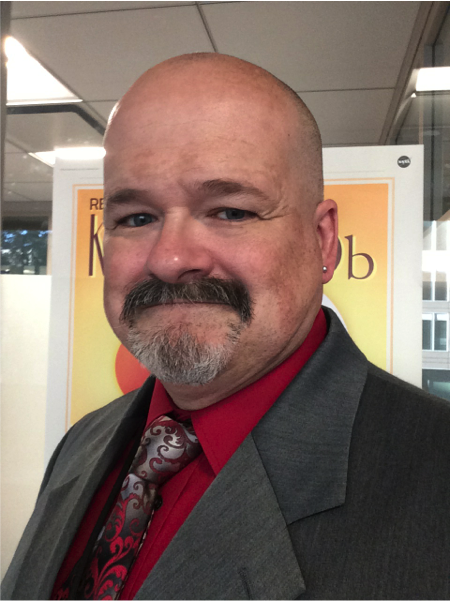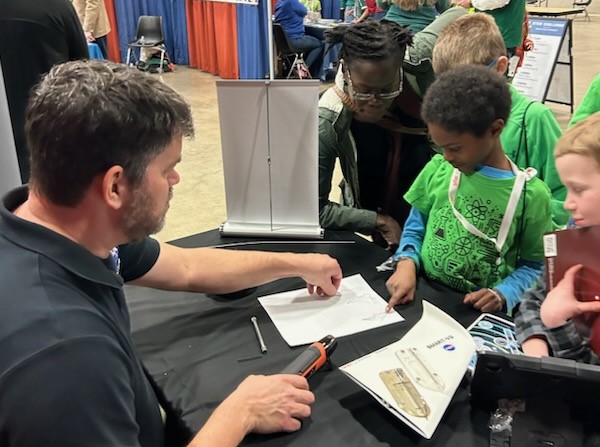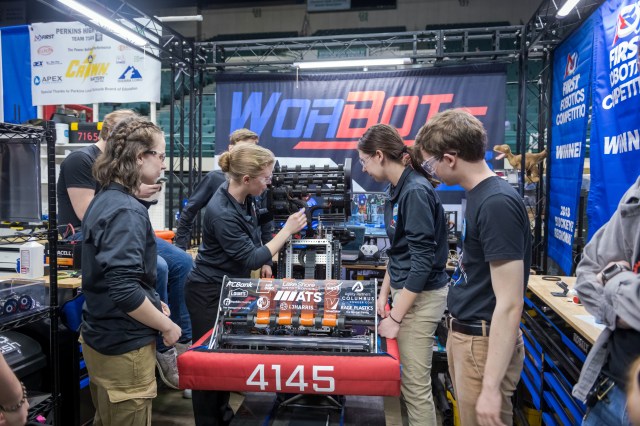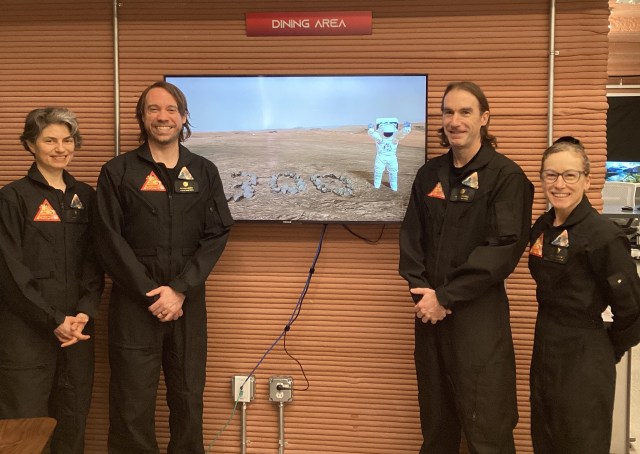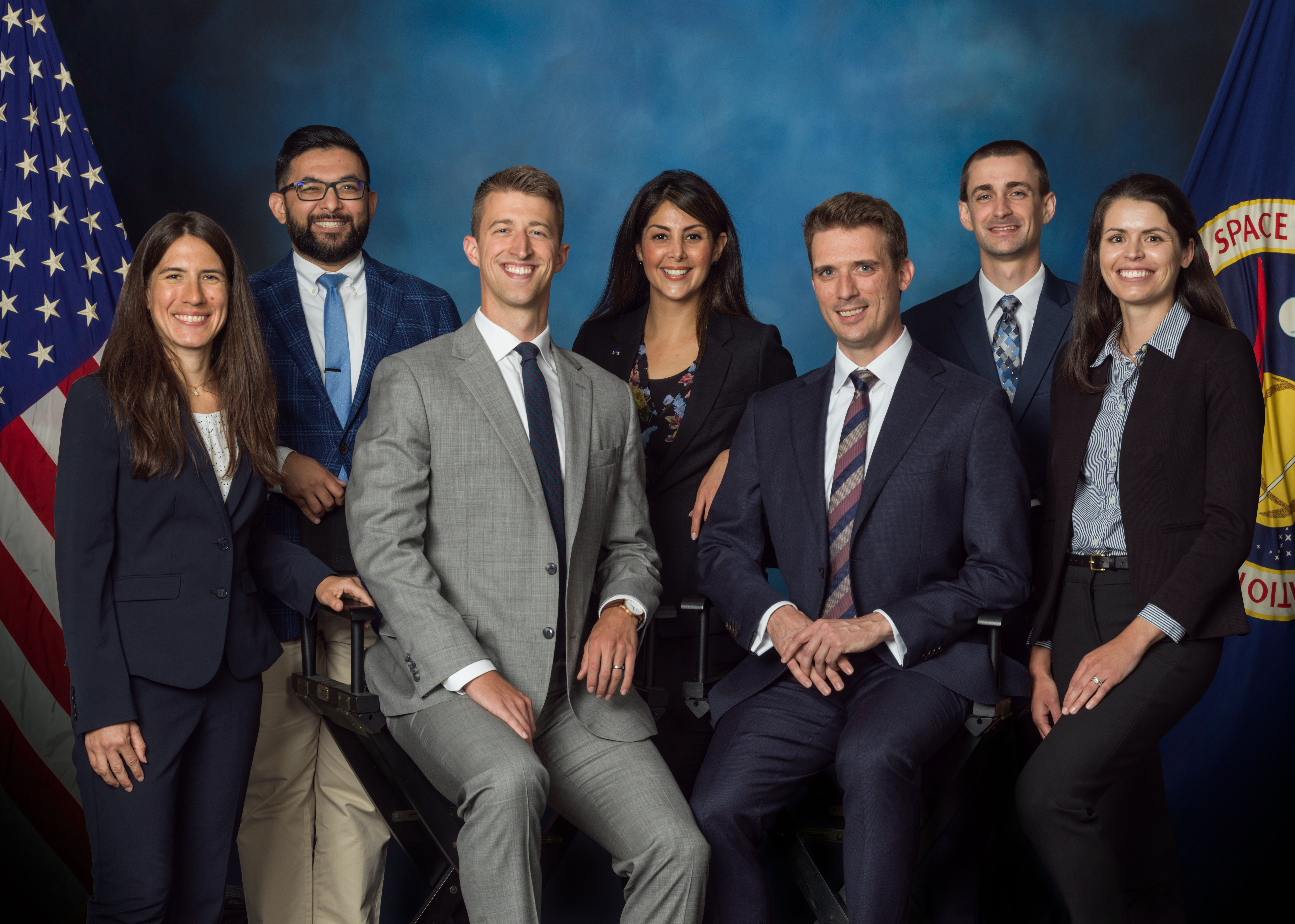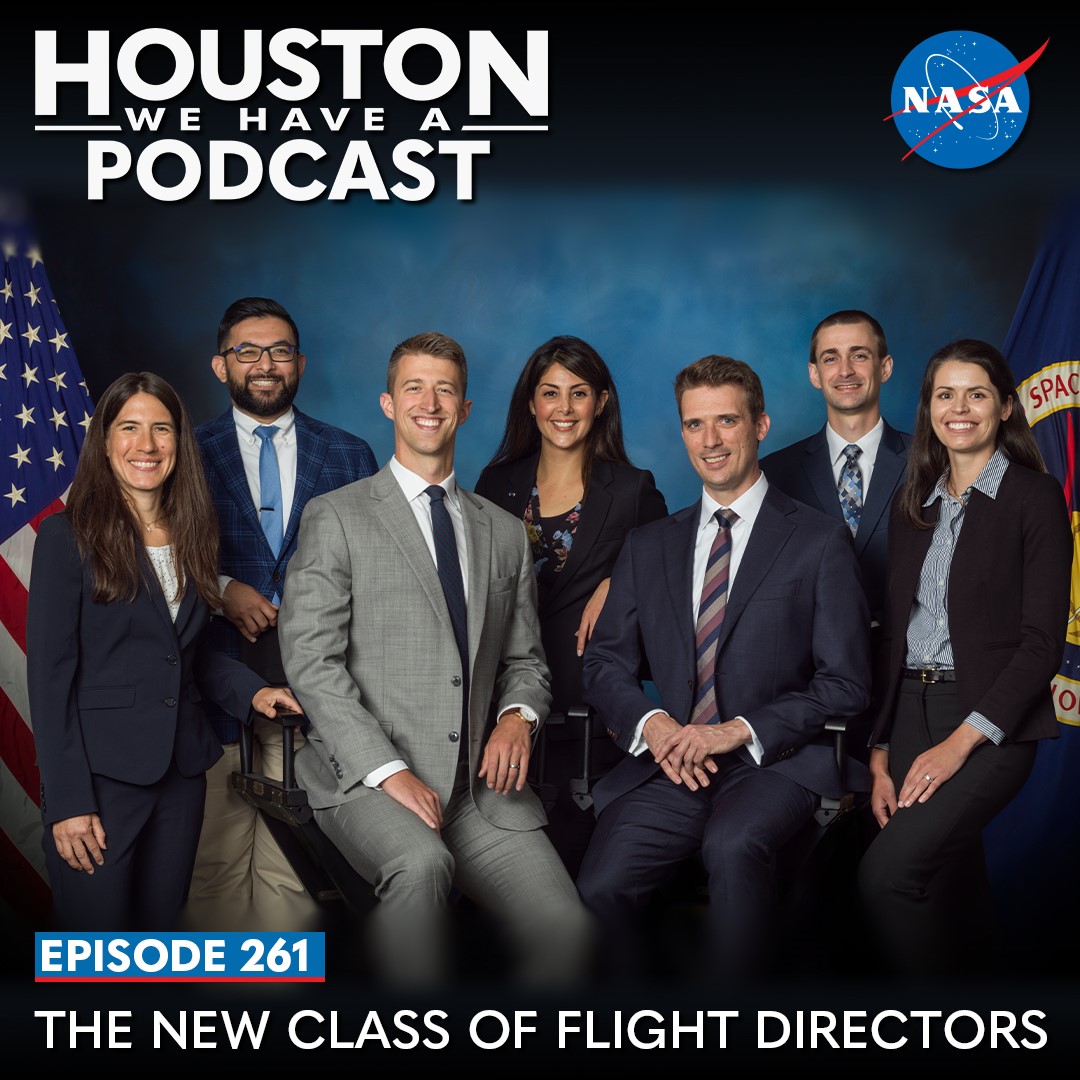
From Earth orbit to the Moon and Mars, explore the world of human spaceflight with NASA each week on the official podcast of the Johnson Space Center in Houston, Texas. Listen to in-depth conversations with the astronauts, scientists and engineers who make it possible.
On Episode 261, four of NASA’s newest flight directors discuss their new role at NASA, their journey to where they are now, and how their expertise will be critical in humanity’s return to the Moon and eventually, future exploration of Mars. This episode was recorded on August 16, 2022.
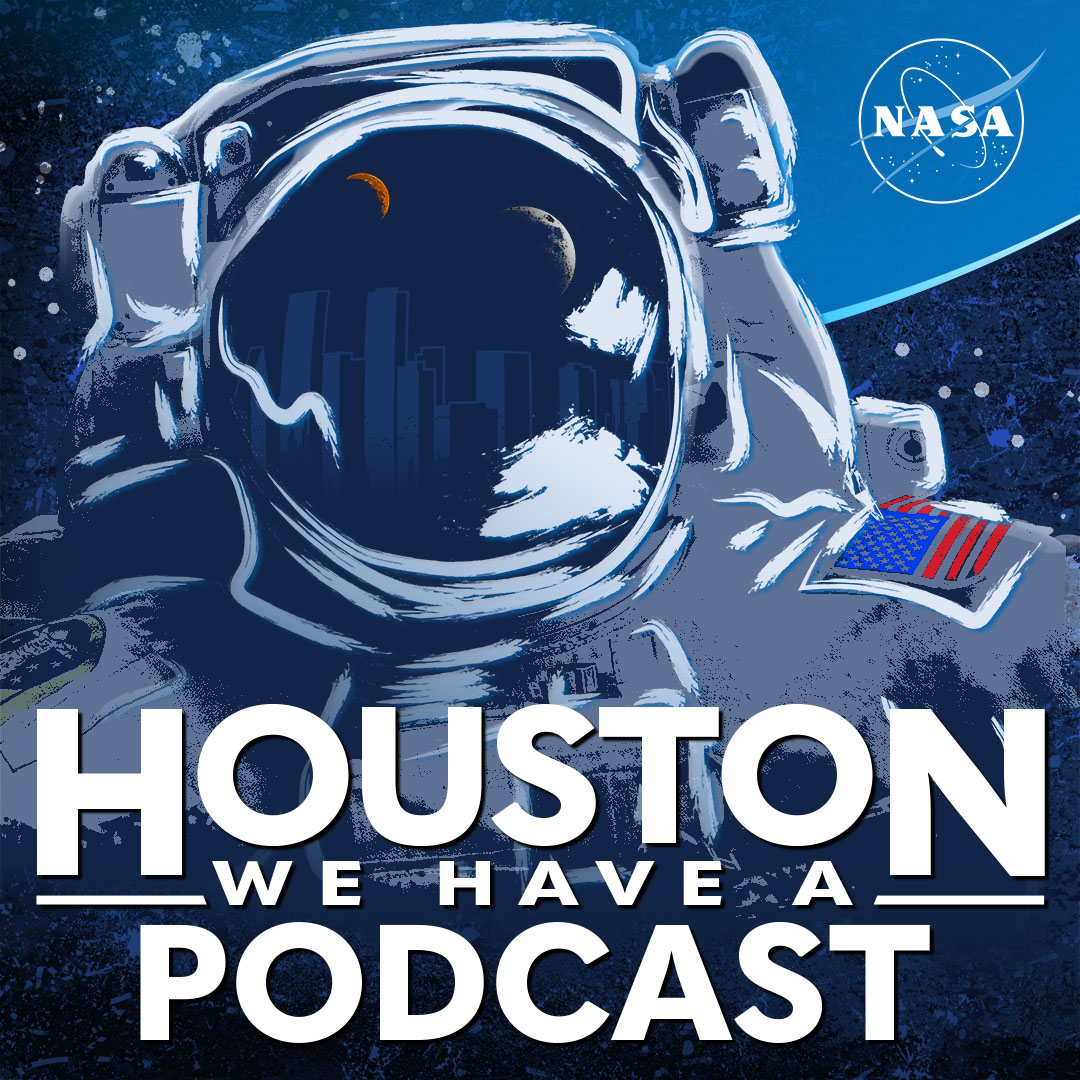
Transcript
Gary Jordan (Host): Houston, we have a podcast! Welcome to the official podcast of the NASA Johnson Space Center, Episode 261, “The New Class of Flight Directors.” I’m Gary Jordan and I’ll be your host today. On this podcast we bring in the experts, scientists, engineers, and astronauts to let you know what’s going on in the world of human spaceflight. NASA’s Mission Control Center here in Houston is constantly staffed to support humans in space for continuing International Space Station missions, and soon for Artemis missions. Individuals in this facility oversee crew safety and mission success. At the helm, NASA flight directors are calling the shots and overseeing all of the operations happening from launch to landing. Following in the footsteps of the great flight directors like Gene Kranz, and mission control’s namesake, Christopher C. Kraft, NASA has selected seven new flight directors to add to the rare and historic position that leads human spaceflight operations. These folks are taking on the very real and very serious responsibility of making critical decisions during a spaceflight, with all the flight controllers and especially the astronauts leaning on their expertise and demeanor to make the tough calls. It takes a great amount of skill, discipline, and expertise to even be chosen for a position such as this. Joining us today, we’re honored to have four of NASA’s newest class of flight directors to talk with us about their new role at NASA, the journey to how they got there, what they are looking forward to, and how their expertise will be critical in humanity’s return to the Moon, and eventually future exploration of Mars. Joining us [are] Ronak Dave, Garrett Hehn, Nicole McElroy, and Elias Myrmo. With that, let’s get right into it. Enjoy.
[Music]
Host: The new class of flight directors, thank you so much for coming on Houston We Have a Podcast. Really excited to get into this and especially why you choose to do this crazy job; really important stuff, but we’ll, we’ll get right into it. A lot of you guys here today, thank you all for being here, because there’s seven of you that were selected and four of you decided to be on this podcast, let’s just start by just getting our listeners acclimated with your voices. Ronak, why don’t we start with you: tell me about you, you started as a co-op and then eventually made your way to becoming a flight director. Tell me about your journey.
Ronak Dave: Yeah, sure, Gary. So my name’s Ronak Dave. Like Gary mentioned, I started here at JSC as a Pathways intern, formally known as the co-op program back in 2011…we actually spent some time together in that program. NASA was somewhere I always wanted to work and, and luckily got the opportunity through that program to work here at JSC and do exactly what I wanted to do in working in human spaceflight operations. And over the four semesters I spent here, that allowed me to leverage a full-time position in the operations world, and luckily got a full-time position here at JSC, started working in ISS operations, moved on to working on CST-100 Starliner operations, and then SLS (Space Launch System) the launch, big launch vehicle, and Orion spacecraft operations.
Host: So, a little bit of everything.
Ronak Dave: Little bit of everything.
Host: OK, that’s good. I guess it was, do you think that was that diversity where you just tried a little bit of things where that eventually sort of led you to thinking, maybe I want to be a, maybe want to take it to the next step?
Ronak Dave: Yeah, I think that was definitely a part of my thought process, even back as a Pathways intern my intent was to see as much of the operations world as I could. So I intentionally went to different operational organizations to see how they were thinking, what their problems were and, and how that kind of fit into the big picture. So that is something I think definitely helped me get to where I am today.
Host: Awesome. Good to have you, Ronak. Garrett, what about you? What led you to where you are?
Garrett Hehn: Yeah, I, I graduated from Virginia Tech in 2014 and I knew I wanted to do engineering. I think the sheer number of LEGOs in my parents’ attic are probably the, the best evidence of that fact. But I was a little different in that, you know, I was very, very excited to join NASA. I don’t think it was always the goal, I never really knew or looked that far ahead. And kind of as I went through my time in school, I just wanted to work on the fastest and the most extreme environments, and that kind of led me to aerospace which ultimately led me here. And I jumped at the opportunity to join the trajectory operations officers, the TOPOs, that work on console for ISS. Orbital mechanics was my favorite class in college, so it was a pretty brilliant fit. I think what allowed me to get there and has helped me reach the level of the flight director is just teamwork, knowing how to work on a team, knowing how to lead a team. When I was at Virginia Tech I was a part of the swim team. I swam for the first two years and I was a coach for the last two. And so, I recognized kind of the parallels when I got here in MCC (Mission Control Center), how much I loved being part of the team, and as soon as I walked in the room and saw the flight director as the leader, I kind of put in my mind of, you know, that, that’s the goal that I want. And, really, really excited. It’s, it’s an honor, honestly, to be selected.
Host: The leadership mentality seems to be consistent. Was it you, you mentioned the swim team, you were also an instructor for quite some bit, some, sometime too.
Garrett Hehn: Yeah. Yeah. The, the TOPOs are a pretty small and agile group. There’s not a lot of the, the trajectory folks, and so those of us who achieved the certification, all of us acted as instructors as well.
Host: Yeah.
Garrett Hehn: So kind of teaching that next generation, being able to pass on lessons learned, being able to set an example, even in just your behaviors, I think is a big part of it.
Host: Awesome. Awesome. Good to have you, Garrett. Elias, what about you? What led you here?
Elias Myrmo: Yeah, so I was born and raised in Naples, Florida. Growing up in Florida we had a lot of space shuttle launches and really, since I was, as long as I can remember, was just enamored by NASA and the space program. So really, my whole track was always to get out to Houston. Growing up in Naples, which has beautiful beaches, everyone kind of looked at me weird when I was like, I want to move, I know I want to move to Houston when I grow up.
Host: They’re like, why? [Laughter]
Elias Myrmo: Yeah. Like, why would you want to do that to yourself? So I graduated from the University of Central Florida, had an opportunity while going to UCF actually to intern out here in the operations planner’s group, who kind of manages the timelines for, for the astronauts, and really got my first taste of, of mission control and, and kind of growing up and, and looking towards mission control, that’s kind of where I wanted to work. But you really don’t know until you show up here, is it going to be everything you think it is? And, and it was; I still get goosebumps walking through mission control today. So graduated and then ended up getting a job, working on the computer infrastructure inside of mission control, so get, got to work on this really complex, amazing building, learning about how all of the, the wiring and the computers work behind the scenes and how they support all of our human spaceflight programs. I showed up here before the shuttle had retired so I got to work on some of that. Worked on Constellation, which really is, through its ashes became Artemis, so had some familiarity with a lot of the, the things that we’re doing for Artemis today. But ultimately wanted to be a flight controller, so when I showed up, I had been hired by somebody that was, kind of my mentor when I was an intern, and obviously in infrastructure I wasn’t a flight controller yet but had an agreement that after two years of service with MCC infrastructure, I could go be a flight controller. So two years on the day, I walked in and I was like, hey, it’s time to make good on that promise. And they sent me over to be a CRONUS (Communication Radio Frequency Onboard Networks Utilization Specialist), which manages all the, the computers and the communications equipment on the space station.
Host: Yeah, and the cameras. We love you guys.
Elias Myrmo: And, and the cameras. Beautiful views of the external cameras, which are now high definition.
Host: Yeah.
Elias Myrmo: Back, back then they were standard def[inition], so we’ve had a lot of fun upgrades over the years. So I was able to do that for, for about five years; had a blast just working in mission control, racked up about 2000 hours, supported all sorts of missions, kind of the first cargo missions, got to lead an increment. It was, it was just a lot of fun. And then after those five years — kind of like Ronak — I thought diversity, the goal was always flight director but getting diversity in operations I thought was important, so had an opportunity to actually be the group lead, or basically lead of a flight control discipline. In this instance it was the FDOs, or Flight Dynamics Officers, for Artemis. So kind of similar to Garrett, it was the trajectory officers for the Artemis mission, which again, was, I also love learning new things and this was all new. My degree is in computer science; these guys were a bunch of rocket scientists figuring out how to go to the Moon. There was a steep learning curve, but they were really just an amazing group of folks that a lot of them actually had worked on shuttle. So, so go from this kid, like watching the space shuttle and enamor[ed of] these flight, flight controllers and now kind of leading them as we go back to the Moon was, was really an honor in and of itself. So did that for about five years and then, recently got selected as flight director obviously. So again, kind of that diversity of experience throughout the entire time and the thing that I just love about operations is it’s something different every day. And I love problem solving. So it’s, it’s different, it’s in space and it’s, it’s solving problems every day. And, and really the, the Flight Director Office is, is the pin, pinnacle of that, right? You get to span all the programs, all of the technical disciplines. That’s always kind of, again, been the goal. So like, like Garrett, I’d say, I’m honored and privileged really to, to be part of this office now.
Host: Yeah. You think it was your pursuit to get out of your comfort zone and try something, I mean, being the only computer science with a guy, bunch of guys who were like, probably, you know, dedicated most of their career to orbital mechanics, you, you know, that’s, that can be an uncomfortable position, but you tried it anyway.
Elias Myrmo: It, it was certainly uncomfortable to start with. Yeah. It was really to find the common areas, right? It turns out that a lot of people don’t use slide rules anymore, they actually use software, so the computer science pieces of saying — yeah, your listeners probably don’t know what a slide rule is; [Laughter] go Google “slide rule,” there’s, there’s a really good Wikipedia. So, but, but now you had all this software, so, and, and it’s a bunch of rocket scientists that, that know how to do all the math but, but don’t know necessarily the software requirements. So there was definitely a good mesh in there…
Host: Nice.
Elias Myrmo:…that we earned each other’s respect pretty quickly.
Host: Very cool.
Elias Myrmo: But it was cool to learn from them too.
Host: Very Good. Good to have you.
Garrett Hehn: I actually got to start working under Elias for the past couple years when I got to do lead for Artemis II as one of the FDOs. And I can definitely attest of Elias’s ability to see the bigger picture, which can be tough when you have a lot of, you know, super-math-heavy people like myself that are excited to talk about math and, and do math all the time. You know, I, I definitely saw his ability to, kind of, kind of lead that group and shape the way we were headed, so, you know, it was no surprise to me to see that he was also selected.
Host: I would definitely want to hit that, that idea of the bigger picture, because I feel like as a flight director that’s probably one of the more important things, right, to pull back and not get terribly in the weeds and trust your team to get into the weeds. Well, we’ll circle back on that real quick. Nicole, you have a little bit of a different trajectory, right? All these guys spent a lot of time at NASA, not so much for you.
Nicole McElroy: Yeah, definitely a little bit different. So I graduated from Columbia University with a degree in mechanical engineering. And then out of school went to go work for Virgin Orbit, which is a small launch company in Los Angeles. I actually interned there between my junior and senior year and then came back full-time. I was working in the propulsion team doing systems design, which is pretty much everything that’s not the engine on the rocket, so all of the pressurization fill valves, all the rest of the systems. And then as we were developing and building our very first rocket, I was one of the system level people that understood how all of the different parts needed to come together, so I was really involved with physically putting the first rocket together and then figuring out what to do with the first rocket and how to get it actually working. One of my favorite meetings was like sitting in a room that was like, oh, how do we turn it on? Like, we have all these power systems, we have all these propulsion systems, but like, what button do we push? So things like that along the way, of figuring out system-level integration between all these different teams that had done all this different design, which then turned into system-level testing, which was the whole vehicle, we went through a stage test campaign which is hot firing the engines while connected to the tanks using the flight computers and the avionics, and pretty much proving that the rocket works on the ground before you try to launch it for the first time. So that got me excited about doing operations and then I continued to go into the launch operations side of the world and follow the rocket through the first four launches while I was there. The first two, I was the rocket specialist on console, so kind of looking over the entire rocket systems, and then the second two that I was there for I was the launch director, so very similar to a flight director role here but really integrating all of the different teams. We had teams that represented rocket systems, teams that represented ground systems, teams that represented plane systems, because we were unique in the fact that we launch off of the wing of a 747. And all of those systems had to be ready for launch day. So I was responsible for the rocket, essentially once it left the factory and then all of the work to get it ready for launch and actually get it off the ground on launch day.
Host: That’s a lot of responsibility. What made you want to take on that level of responsibility as, like, you could have stayed at the systems level, right?
Nicole McElroy: Sure.
Host: You wanted to, you wanted to lead, you wanted to keep going. What…
Nicole McElroy: Definitely. I think it’s similar to everyone here is like, again, being able to see the big picture in that system, whereas I understood how the rocket worked but you really actually need the rocket, the ground, the plane, all the data systems all working together to make the day successful. And I kept wanting to see more, right? Like, and kind of see more of how those puzzle pieces could really come together such that the day was successful overall.
Host: So we’ll start with you Nicole, and then I want to go sort of around to everybody here and just sort of understand this opportunity came up to be a flight director. And I want to start with you because yours I think is particularly interesting in the, in the fact that you’re coming from a different world and now you have to enter into being a flight director. What, what attracted you to this position to take on that next step?
Nicole McElroy: Yeah. It was really kind of the excitement of being able to use a lot of those skills and a lot of that experience of integrating a team, and working through live operations, doing console work, and then put and apply that to something as cool and as exciting as human spaceflight. So it was a next exciting step for me, probably a little bit different to everyone else. I applied on USAJOBS.gov and just like submitted my application into the void; it was like, OK, we’ll see what happens. But then got the call to come in for an interview and did a couple rounds of interviewing and, it all worked out that got me here. But I’m excited to be able to kind of integrate some different perspectives and different backgrounds into a very established role at the moment working on the ISS and then continue to build that as we go through the next, next series of getting ready for everything.
Host: Now, one thing that I think, before I forget to ask you is, one, one thing that I think is a unique perspective of yours is the culture, right? These guys…
Nicole McElroy: Yeah.
Host:…these guys definitely have been in the flight operations culture for a long time, right, for very long time. This one, I mean, of course, you know, you, you’re not, you’re not unfamiliar with operations…
Nicole McElroy: Right.
Host:…it’s just the new part is the NASA operations. So I wanted to get your perspective on the culture shock that hit you…
Nicole McElroy: Sure, sure. I think the, the cool and good thing is that, kind like you said, every control room is very similar in that, like, a control room needs to be very calm and very organized and very methodical about working through problems, and so sitting in the control room here is actually very similar than sitting in the control room at Virgin Orbit and I think most control rooms around all the different companies that are, are doing different mission operations. I think the cool part about NASA culture overall that I’ve experienced over the last couple months is just how collaborative it is, and it’s really everybody’s kind of working towards these bigger goals that really only NASA can be driving, kind of, as the point of pushing everything forwards, and kind of being able to see a, a bigger, bigger picture of like, what are we doing as the U.S. space programs and how do all of the different companies help support that? Whereas commercially, you’re, you’re trying to figure out what your part is in that bigger picture and, and get that mission accomplished; NASA is like driving a lot more of what that is and be able to integrate different people in different companies and work together.
Host: Interesting. Elias, you’re hearing Nicole’s word about the culture. You’re very familiar with it, right? You’ve been over a decade in, in mission operations. Give us a sense of what that, for, for folks that may not be familiar with it, for especially, you know, Nicole who’s entering into it and getting a feel for it, just what, what is that general culture that’s, that’s happening here?
Elias Myrmo: Yeah, I, I would say that I think operations does translate well to other areas that do operations, whether, military does operations all the time, obviously commercial spaceflight has been a burgeoning industry over the past ten, 15 years, so they have kind of the control rooms, the methodical pace, the marching through things. But I think, as kind of Nicole touched on, we really are the hub of human spaceflight for America, and really as America is, is the leaders in human spaceflight really around the world, it’s like the only place in the world that you can kind of do this. Obviously, Russia and China have, have pieces to that, but we have decades of experience, we have an International Space Station that, that has been continuously crewed for the past two decades; we have commercial partners coming online and flying to the space station; we’re about to launch the Artemis rocket to the Moon. And, and really all of those things creates this interesting collaborative culture. It’s really pushing forward kind of what NASA’s doing, again, with, with partners. We’ve had a lot of experience with international partners; I think that’s probably unique to, to the commercial industry that Nicole comes from. Obviously, we have the Japanese, the Europeans and the Russians all working with us for the, for this common goal. I know folks talk a lot about the International Space Station should win a Nobel Peace Prize because it’s the best example of, of really collaborative humanity doing something for the greater good that, that we have, and, and I think that’s true. But now over the past ten years bringing on the commercial elements is also super-exciting, right?
Host: Yeah.
Elias Myrmo: So instead of having to rely on NASA spending billions of dollars to build this, this one rocket, now we’ve got, you know, three spacecraft that are, that are, that’s human rated that are going to space, right, between Orion and Dragon and, and Starliner. That’s never happened in the history of, of America, right? And we’re on the, the precipice of, of I think just a really cool environment where we have easy access to space. We’re going out to the Moon and, and flight operations, to pull it back to the culture stuff, is really pulling all of these different companies and, and government pieces and international partners together for this common good. Because at the end of the day the flight director is responsible for the crew and the vehicle safety, right? So it’s our astronauts that are onboard these vehicles that are, that are taking these risks. And so that all comes back to the flight director leading this team to, to achieve these, these really awesome feats that, that we’re about to go do.
Nicole McElroy: I was just going to say, I think a lot of that, too, kind of like, I’m sure we’ll get into what does the job look like, but there’s so many different projects that the Flight Director Office is working on that kind of represent that, right? There are representatives that are paying attention to SpaceX or Boeing or any of the other partners that we’re working with and working to make sure that those missions are successful and safe. And it really kind of gives a interesting and cool diversity of the work that everybody’s doing and how all of those things then can learn from each other and make sure that everything is successful overall.
Host: You guys have gotten a feel for it for, for many years before accepting the flight director position, you know, and flight director is of course a certain level of responsibility. In a sense, you almost kind of oversee this culture and enforce this culture, but you guys have been living it for, for quite some time. Ronak, just a sense of, I mean, you’ve been, you’ve been in mission control for quite some time; thinking about just that level of training and, and responsibility that comes every time you come into that room, something that you, that folks may not know about being a flight controller, when you walk into the room, you have sort of a certain mindset. What, what, how do you enter mission control?
Ronak Dave: Yeah, absolutely. I, I think there’s a, a very solemn and awesome responsibility you’re handed when you walk into that room. That goes down to the flight controller level, right? Every system’s flight controller that walks in is given the keys to the space station and is given ultimate responsibility for their system, to make recommendations to the team to say, this is my system, I understand what’s going on, there’s something wrong with it, we need to take these steps to make sure that the crew and the vehicle stay safe and that we can continue to execute the mission. When you look across the board, you want all these systems experts who are given that responsibility to then inform the flight director, who has the risk-taking ability to say, OK, I understand what you all are saying; maybe we have this many problems, now I’m going to dictate that within the context of the rules we’ve been given and the agreements we have with the program, that we are going to go do these things in this order, and I understand it may not be the best for you and it may not be the best for you, but looking at, I’m going to say it again we’ll probably say it a lot today — the big picture — which you may be the only person as a flight director looking at that big picture at that time, to give marching orders to say let’s go execute this in this order to make sure that we’re keeping the crew and the vehicle safe. And, and that responsibility and, and the onus of that is significant, and I don’t think anyone takes that lightly. I can tell you for, even at the flight controller level, right, we do a lot of simulations and we train people very well. The first time you walk in there on your own and you take the console as a solo shift, you feel different, right? You, you’re thinking different, your brain turns on and works over-clocked, you’re running at 120%, and everything’s calm, everything’s methodical, right, but you’re thinking differently, right? It, it, it is a different mindset and people deal with this differently, but for me it was absolutely a different mindset that you would walk in with where you have to be ready to respond to anything that day. And, and certainly that sort of mindset exists at the flight director console too, right? That every day you go in there, you’re running a timeline, you might just be working on paperwork, you’re getting ready for the next day, maybe the next complex op[eration], but at any moment in time something could happen in the most unforgiving environment where you have to go make sure that the crew stays safe.
Host: So what, tell me about the mix of the, when you talk about 120%, what’s, what is it, is it a social thing, is it a, is it a speech thing, is it a technical thing? Is it a very powerful mix of all of those things?
Ronak Dave: Yeah, I’d say it’s probably a mix, and it probably depends per, per person. I, I, these guys can probably tell you that when I’m just chatting with you, my voice sounds different on the loops. It’s not something I do consciously, it just kind of happens. There’s also just the thought processes, right? You’re obviously doing your, your, what I’ll call quote unquote, “housekeeping work,” right, making sure the console is operating, making sure that you’re taking care of the paperwork that needs to do. But in the back of your head, you’re always thinking about what could happen. And then if something happens, you’re working on it and maybe something that happens all the time, but then you’re also thinking about, well, what could happen now that makes this worse? And that’s a, a process, if you will, that for me is constantly running. And, and there’s…when, when I did sets of shifts, right, that’s something that would last days and, and it will drain you. And that’s something that we tell a lot of flight controllers in training is sim[ulation]s are draining; it’s a long day. But when you get into the real control room with the real vehicle, it’s a different level of kind of stress that you put your body through. And it’s a different level of anxiety that you have to learn to harness to be able to work more efficiently.
Host: Garret, you’re probably, you’re listening to this mentality, I’m guessing, very similar things happening in your world.
Garrett Hehn: Yeah, absolutely. Yeah. I think it’s something that we instill in flight operations very intentionally. I think there’s a, a process: some of this is accumulated from experience, some of it is, you know, from actual psychology research, but the idea of how do you get that optimum performance and, you know, we have, we have some keywords, we have some tenets, that are just kind of little triggers for everyone about, you know, the responsibility required, how vigilant you have to be, you know, these are just some words that get thrown a lot around in MCC, you know. Even, we moved into our new offices and a lot of people have, you know, first thing they did, walked into that whiteboard and put “Tough and Competent” on the top of it. You know, and that has history all the way back to the Apollo 1 fire, because that’s the sort of…that’s the sort of community and internal foundation that we want to create. To me, it kind of, walking and going into MCC, I really like that Ronak said that it is, it’s, it’s different. You know, we try to make the sims as stressful as we can, but it is different when you’re dealing with the real vehicle. I likened it, too, to swimming to athletics where you kind of want to find that flow, right? You want to find that middle ground of, you know, I’m, I’m feeling the stress, I’m putting it aside if it’s, if it’s not productive, and I’m, you know, making sure that my focus is in the right place and that I’m, I’m working the problem, right? That’s another, you know, Gene Kranz-ism, right?
Host: Work the problem.
Garrett Hehn: Work the problem. Don’t make it worse by trying to spin your wheels over something; you know, be methodical. And, you know, Nicole used that word too of, it’s kind of universal to ops of the, the deliberate nature that you need to have. And sometimes that means slowing yourself down.
Host: Let’s go around and talk about the flight director position, because we’re getting a sense of the seriousness of the culture and of course you guys have been in the operation, all of you have been in the operations role for quite some time. But when you, I think this is a really good segue into talking about why you wanted to do this, because it’s a very serious thing. It’s a, and, and, you know, it takes a lot, you know, like even just hearing you guys, it’s just like, gosh, this is stressful, right? [Laughter] But you guys want to take it on, right? So Elias, we’ll go back to you for a second. It’s just, you know, you said you wanted to, you talked about diversifying your experiences and, and getting, going out of your comfort zone and something is, is the flight director just naturally that next step? What really made you want to pursue being a flight director?
Elias Myrmo: Yeah. I mean, I think I always wanted to be a flight director from when I saw “Apollo 13” because it was, it was kind of this role that’s leading this team of technical experts solving hard problems in space. Love space, love space shuttle, all that stuff. But then really the, the problem-solving aspects to it were fascinating watching “Apollo 13” and all of the problems that they had to work through and methodically working through them and, and saving the astronauts, right? So that was always the kind of the goal. And then the career path really was the diversity of experiences to kind of set me up to, to hopefully be a good flight director with, with kind of those backgrounds, to understand kind of what CRONUS does and how they fight problems versus how a trajectory officer will fight problems, and how going in the Moon is different than hanging out in LEO (low-Earth orbit). So all of those things I think culminated in, in kind of just a, a good resume for, for flight director. But I would say that path was also a lot of fun. Again, I got to solve problems as a CRONUS for the space station, whether they were computer, computer failures or camera failures, as the case may be, to, to really helping develop all of the, the plans and procedures we’re using for, for Artemis I from a trajectory standpoint. So having a hand in all of this development as we go back to the Moon was super-exciting, but then also kind of shaped, I think, how I’ll become a flight director, right, because I have, I’ve got some of technical knowledge here but also just the process in which you go about solving problems and operations, which I think is, is really probably the key that we all have experiences doing that around this table. And, and that’s, that’s super-important. And then the other piece too just added the culture, like Garrett talked about some of the foundations, but one of the other foundations of, of flight operations is really to be unexpectedly put in a situation where your actions have the ultimate consequences, where the crew is really dependent on you and you, you don’t know when you’re about to see the board light up with a bunch of emergencies and, and warnings and, and things that are threatening the crew on the space station. And, and that’s kind of, we talk about the stress level in that and it’s the fact that that can happen at any time. And as a flight controller, you know, I’m watching my system kind of ready to, to react to those things. Obviously as a flight director, you’re, you’re opening your, your lens, your field of view, even further to be able to respond to those things. And, and while that probably sounds stressful to lots of people, really being in the situation to help the crew to, to kind of work the team through these problems, is, is what’s appealing about that, that position.
Host: Do you think there’s a uniform approach to the personality traits of a flight director, or do you think each person has their…you guys are smiling; every, you got, well you’ve worked with a lot of flight directors, right, so everybody’s sort of unique.
Elias Myrmo: I, I, I think one thing, getting into the office, one thing that they’ve, they’ve kind of told us, which I think is very true after watching a lot of flight directors, is much of the office, really the whole office, office of flight directors, will get to the same answer about something, but the path that they take will look completely different, pretty much for every individual, about how they approach it, their biases, their experiences, how they’ll try to solve these things. So while, while there’s consistency in that, that model of how you get to the, the end goal, how you get there, I think, is colored by the, the vast diversity of experiences and personalities that we have inside of the office.
Garrett Hehn: And I think the simplest way that I can think of putting it is leadership has to be genuine. And so everybody has a different genuine style, it’s got to work for who they are, because, you know, our flight controllers are, are humans and they’re not going to respond to somebody putting on airs or trying to be something that they’re not. So it, you know, that’s sort of part of our training that is definitely a, a topic, we as the newest class talk about a lot of, you know, what are these different styles? What, what works? And we’ve been encouraged by the veteran flight directors of, you know, part of this process is figuring that out and trying new styles, and seeing, you know, how do people respond when you use a different method to arrive at that answer.
Ronak Dave: And part of that is if you’re in one of those emerging scenarios, right, if you’re in a, a fast-developing, changing, high-stress environment, you’re going to download to who you really are. So you can try and put on a face and be different, but one of the biggest pieces of advice I got trying to get into this process of applying was just be yourself, because at the end of the day the office and the chief flight director, it is their duty to trust you, and that trust is what puts you on console. And they trust who you are, and in making those decisions you have to be yourself because when it gets hairy, right, that’s what you’re going to become. So that, that was a, a something that I really thought about and, and think about today, right, of you can’t try to think about things differently because you are a new person now, or this is your, your job is different, and people look at you differently. You have to be able to be yourself all the time.
Host: But it’s kind of like, like in an add, it’s kind of like the best version of yourself almost, right? It’s, it’s still yourself, but you come in, like, from a preparatory standpoint, like you kind of have the knowledge and everything, but you also sort of have the best understanding of yourself and the best mentality.
Ronak Dave: Yeah. That, that’s a, a great note, Gary, because that’s something we’ve explicitly talked about as well. So you, you want to be yourself, right, but that doesn’t mean you can’t improve yourself. And you can’t become the best part of yourself. And some of that means you need to understand your weaknesses, you need to understand your biases, so that when I’m asking questions of someone, I know that, well, I would think about it this way but I, I am colored by other opinions or thoughts or prior knowledge of a system. But you need to be able to acknowledge that when you have those conversations, and in using that becoming the best version of yourself.
Host: Is that sort of what led you to apply to be a flight director, was taking that next step, being the best version of yourself, or maybe it was more natural than that?
Ronak Dave: Yeah, no, I, I think that was part of it, maybe from a different perspective. I started my career in ISS working in the attitude determination control officer console position, so making sure we’re orienting the, the ISS the correct way. And in that I, I started training and getting certified just as a flight controller, and, and when you start right, you’re just slamming shifts — you’re working a lot of console and you become very proficient at flying the spacecraft and doing what you need to do to keep us flying around the Earth. Once you start doing that, you also start to pick up these projects, right, and, and open your lens of getting into more complex things: how do I go catch this Dragon spacecraft and attach it to the station, what new operations can we do to improve how we fly the space station? And that started to shift my focus, right, of from that position looking at the bigger position of, bigger picture, of what are the small things we can do to improve how we operate this vehicle? Moving into the propulsion world, where I started to pick up CST-100, Orion and, and SLS, there the lens got even bigger, right, where I’m now working with commercial partners and, and helping integrate different parts of a program and talking to people from different centers and, and realizing that operationally, when the clock hits T-zero, we are the ones who are responsible for everything that has to do with smoke and fires or brains on a rocket, which means I need to know everything. I also need to know how that connects to the Orion spacecraft. And really, if you look around the landscape of all the people developing this hardware, they are acknowledged, they acknowledge the fact that they have to interface with these different vehicles and that’s a part of their requirements and what they design to, but when you think about problem-solving across the entire thing, we are kind of the big picture thinkers that are connecting all those dots. So seeing how I could help folks in designing this, this spacecraft and the rocket to connect those dots earlier, so that when we get to flying it it makes our life easier and it’s safer for the crew, that’s where I really started to open up the landscape and see that the, the job we do as operators and really as flight directors is not just the technical, right, it’s a lot about building relationships and a team so that not just when we’re in the operational arena but when we’re leading up to it, when we’re planning, we’re training, we’re developing new vehicles, that we can work with all these teams and make sure that we emphasize why our point of view is important and how that impacts designs and how those things are usually not just good for the crew safety and, and how we operate a vehicle, but are generally more integrated as, as design philosophies and, and then end up with better vehicles as such. And that’s what kind of got me to, well, hang on, like I’m making a difference at this level, right, so could I leverage that to make a difference at a higher level?
Nicole McElroy: And I think the cool part about what he touched on, right, like we talked a lot about the execution side of the flight director role, but there was also a lot of the planning and pre-coordination part of the flight director role that is working with those same teams but way earlier in the processes such that you have that relationship built and also have all those plans and everyone’s vetted it through early on, but the flight directors are still pretty crucial in leading those efforts as well as leading the on-console execution.
Host: Nicole, do you feel like you have an extra challenge because these guys have been in the world for so long? Do you feel like you have to play catch-up a little faster, or do you feel like, like the training is sort of…
Nicole McElroy: Sure. No, the, definitely I’m playing catch-up on the language, I guess I would say…
Host: Yeah, yeah.
Nicole McElroy:…and, like, the experience, right? Like, we are in classes right now and there’s a lot of work to just understand how the ISS works and functions and how the systems do what they need to do that a lot of the rest of the class already has, right? Like, they’ve been experts on those systems before and operated them and understand what people in different console seats have also been doing. So I’m definitely trying to catch up there, but it has been interesting in a way that as I learn things from scratch here, I have a different reference frame of a different system that’s worked somewhere else and that allows me to maybe bring in questions that kind of come at things a little bit sideways, and kind of ask questions that every now and then I challenge the knowledge of the class and like make people think about it a little bit differently. And then as a group we can kind of have a more collective understanding.
Host: Do you guys see that when you’re in classes together, like Nicole is bring in a new perspective?
Garrett Hehn: It’s a total asset to our, to our learning, even of us who have been here for a while to have that fresh perspective. You know, Nicole and Diana [Trujillo] as well coming from external to Johnson [Space Center] bring a angle that either we don’t see or sometimes you take for granted, right? And so there’s definitely been times where, you know, Nicole’s asking a question and I’m like, I think I know the answer and then the instructor answers and I go, I did not know. [Laughter]
Host: Because to Ronak’s point, like this is probably going to be the new normal, right, have, needing this perspective, needing the perspective of commercial industry. If you’re talking, if you’re working with commercial industry now, Ronak, I mean that’s, that’s like, you have to understand that mentality and having a person, especially your perspective, Nicole, having like that here to kind of bring into NASA’s culture and be like, wow, this is, this is expanding, this is growing, you know, NASA’s, NASA’s influence. Elias, you talked about NASA’s influence being sort of like an international thing, but, but having, bringing on new perspectives has just got to be super-valuable.
Elias Myrmo: And I think really changing your perspective, even coming out of a flight control discipline to flight director, is super-important. So like when I was a CRONUS, like the power system would fail and then my camera — I’ll keep going back to cameras — my camera would fail, then I wouldn’t have a camera. And so that’s all I cared about, and I understood that connection. But then, like going through the training as a flight director, clearly I care more about than CRONUS’ camera, right?
Host: Yeah.
Elias Myrmo: So I think all of us are going through this perspective change and, and having Nicole, and then Diana as well from JPL, come in with these other questions, to, to really start to poke at the different perspectives that you really need as a flight director. I think more than anything, a flight director understands how to work a problem, right? Like, I might not have the technical knowledge of the widget that you’re, you’re working on with the problem, but you know how to attack the problem and figure out what the next worst failure is, what the risk to crew is, what the risk of the mission is, and, and really being able to articulate those questions to get the information at your team is vitally important, right? So having these other perspectives, shifting our perspective, that’s really, probably, I don’t know, at least half the training as a flight director that, that I feel like we’ve done so far, is just getting your mind to think differently.
Host: Well, let’s get into the training. I, I feel like it’s probably, it’s probably interesting, you’re probably getting a whole new perspective. I mean, like, Garrett, we’ll start with you because you, you’ve spent a lot of time as a flight controller, now you’re taking flight director training. Talk about some of the things that you guys are, are starting off with.
Garrett Hehn: Right. And so, we’re a, we’re pretty heavy in classroom, classroom lessons at this point. And I think one of the most exciting things to me is that a lot of the basis of the training we’re receiving is the same training the crew gets, right, because we have a lot of similarity in terms of the perspective of what we need to know, right? Crew is the one in the seats on the vehicle, and so they need that broad knowledge; so we do as well, and we also need to understand what the crew knows because they, you know, are the most important system on board as the human system. And then I think that the second part that has got me most excited for these classroom lessons is the people that teach us, and, you know, they’re oftentimes the top flight controllers in whatever their expertise is, so you really are getting knowledge from the absolute expert — and in some cases, the world — just there to teach you, which is, it’s humbling, it’s incredible, it’s really exciting to go to work when you get to do that.
Host: Wow. So you, so is it, is it really just, you’re getting a sense so, Ronak you talked about having to rely on like each of the different positions; is it really, you’re getting to know that position super-well so you know the questions to ask in the, in the moment where you need, when you need to?
Ronak Dave: Yeah, that’s part of it. And it’s not just the flight control positions, but like Garrett mentioned the, one of the biggest members of our team is the crew as well, right? So before this podcast, actually, a few of us were over in the Space Vehicle Mockup Facility starting our emergency training flow, which is the same emergency training flow that the astronauts would get. So we were putting on gas masks and stuff that you’d use to breathe oxygen in the case of a fire or a toxic atmosphere or emergency, so getting that same kind of hands on with the hardware so that when we hear down from the crew and they’re saying they’re having an issue with XYZ piece of hardware, I’ve put my hands on it, right, I know how hard it is to untorque that bolt, how, how the structure may interfere with it and why they may be having trouble yanking this box out of a rack, right? So it’s a really good perspective building exercise in more than just the information, but having the perspective of, hey, we, we know why you’re having trouble with that connector; I’ve put my hands on that connector, it’s really hard to undo and redo. And, and being able to help with the Capcom talk through that and with the experts who own that hardware, we may be the three people in the room that have done that one thing. So that, that has been a really insightful piece of the puzzle for me.
Host: Interesting. Elias, you, you talked about you’ve wanted to be this, a flight director for quite some time. I wonder if part of the training is hearing from flight directors, hearing from some of the historic, like, well-known heroes and stuff, like, have you gotten to talk to, you know, his, like Gene Kranz and some of the folks that are still around from the Apollo era or any of those?
Elias Myrmo: Yeah. So we’ve actually got to meet Gene Kranz; we didn’t get to talk to him extensively, but we actually have [Rob] Kelso, who was a flight director in the 80s coming and talk to us.
Host: Cool.
Elias Myrmo: So yeah, that’s another cool thing about the culture, generically, right, is flight operation has been around since the 60s…
Host: Yeah.
Elias Myrmo:…and we can trace our lineage directly to that. When I was the group leader of the FDOs I actually had the paper logs from the Apollo missions that the FDOs had written from Apollo 11 and 13, and right, like, they wrote, they had these handwritten logs about the explosion going off and, and this, that, and the other thing. And so, being able to tap into those resources is incredibly valuable and, and they’re more than happy to share their experiences, especially as, as Artemis gets stood up. Gerry Griffin, actually, who was also the, the center director for JSC at some point in the history, was also Gold Flight. We all have our names, right? So gold, there used to be colors, now they’re, you know…
Host: Everything. [Laughter]
Elias Myrmo:…everything.
Garrett Hehn: We ran out of colors.
Elias Myrmo: We ran out of colors. So when you, when you hear a flight director has, like, one of the primary colors or one of the few colors, they’re like, oh, you must have been, you know, one of the guys, right? And so he was on for some of the lunar landers. And as we were kind of even building the flight control team for Artemis and as we look forward being able to talk to him, this was back when I was actually the FDO group lead, but, but they’re more than happy to share those experiences and why they made decisions like they did. So that’s, that’s incredibly valuable. The whole office too, offers up kind of the same kind of stuff. So there’s 30 flight directors right now; obviously, there’s lots of experience of, of recent flight directors of, of dealing with failures on, on console, working through problems, bringing commercial entities online. Obviously, you know, the, our recent history’s been pretty dynamic with just, again, all of the stuff that’s coming online.
Host: Right.
Elias Myrmo: So, so they’re more than happy to, to talk to us and, and share their thoughts and wisdoms, which is again, culturally super-important for flight operations. As a flight controller, I did the same thing as I trained new flight controllers; it’s, it’s the same thing in the flight director office. So passing that knowledge down is really one of the key things that even us as flight directors kind of have to carry that mantle that, that we really trace our lineage right back to, to Chris Kraft, right? So…
Host: Yeah.
Elias Myrmo:…it’s, it’s super-important.
Host: I wonder how much you pull from the past and how much you look at some of the current folks and then, thinking about that and then the future, right? Because obviously, there’s a lot of stuff in the past that you want to learn from. And there’s, there’s, you, we’re, we’re lucky enough to be in a time where, like, you have the original flight directors that you get to talk to; that’s, that’s pretty special. But it is, you know, was like 60 years later, like 50-plus — how, how close are we? ’65 was when, was when MCC was first occupied? So, we’re close. We’re coming up on, yeah, we’re, we’re, we’re getting close on 60 years. So that’s a long time. But, but, mission control has evolved. So I wonder from your perspective, Nicole we’ll start with you, your perspective on understanding the roots of mission control, how it’s evolved and kind of like where this new class might take it in the future. We talked about commercial entities and learning, and its, mission control is growing, we have international commercial partners; talk about that evolution.
Nicole McElroy: Yeah, no, that’s an interesting question because a lot of it kind of coming in, right, like, it’s amazing how many different resources and how much history there is, right, like that I’m kind of coming into, and kind of coming in with all of it just kind of from scratch is really, like, exemplified of, like, how many different places there are that I could go ask someone specifically for information or find that system expert and just have that wealth of information and history available to you, which is amazing. But kind of as we evolve and move it forward, I think there’s a balance of, like, trying to, like, balance both your time, right, like, and you as a person on, like, not getting too caught up in all the history, but still knowing the key takeaways and the important things to use to build on to go forward. So trying to find that right balance of not, you could spend forever, right, like historians do and we’re not historians for a reason, right? So, like, finding that balance of how much of that information to pull on that then I can directly apply to the things I’m doing today and then the things I’m doing tomorrow. And the kind of cool thing is, right, like there have been various phases of human spaceflight, so there’s been transitions like this before, and so trying to look at those as well in order to say, OK, how did that transition go and how did they apply things and how can we mirror that or improve upon it, is something that I could see.
Host: I want to pull on your knowledge too, Ronak on, on this specific topic because of, you said you worked, you work, support, Space[X], you’ve worked Starliner, you worked, there’s like a lot of different, and, and with that comes not just a mission control focus, like, you’re working hand in hand with, like, the Boeing guys, right? And which of course, they’re, they’re pulling on a lot of NASA folks, but still, I mean there’s a, there’s a culture shift. Do you, do you see it and how do you pull from the, same, same question, how do you pull from the past and kind of mix it in with what’s going on now?
Ronak Dave: Yeah, so I, I think that we in operations, and NASA in general, emphasizes lessons learned, right? We, we fly these vehicles and fly these missions to explore, but as a part of that is learning not just about whatever those mission objectives are, but about the vehicles themselves. There were things we were learning about the space shuttle on its final flight. So that’s a process that never stops. That could be at the lowest level of, hey, if you run this prop[ulsion] system at this pressure, these things happen; or it could be, hey, when you’re planning a mission, maybe avoid these months because you have these effects, right? And those are just general examples. But, carrying those across from Apollo and what we learn there and planning lunar missions now, or, or like you’re alluding to, Gary, of having different commercial crew providers and, and making sure that we’re looking at those operations across the fleet of vehicles that we’re working on and see how this thing that we learned may impact everything else, that’s something we actively do today. We’re, we’re taking any learning points we get from one vehicle and, and making sure that we at least evaluate those on the others. And yeah, they may not apply, but if there’s something we learned that could have a detrimental effect somewhere else, that’s absolutely something we want to make sure that we evaluate on those other systems.
Host: Let’s go back to training for a second. Garrett, I want to go to, to you for a second because we’re, we’re talking about training; I want to know sort of what the flow is until you actually are in the hot seat, right?
Garrett Hehn: OK.
Host: What are some of the, what are some of the things you have to go through until like day one, you’re on console and you get your own call sign and everything, and what’s, what’s that going to look like?
Garrett Hehn: Yeah, I mentioned earlier that we’re, we’re pretty heavy into classroom content at this point. And I think the, one of the major switches is when we get into simulations, or sims. And so, we touched on them a little bit earlier; I think Ronak talked about it in his training flow. It’s just like the flight controllers, and the purpose is to try to create as high-fidelity environment as you can, and then experience those failures to test your response. And really that’s your, when you’re in sims the idea is you’re walking in with all the requisite technical knowledge, all the skills already, and it’s really just, just proving it, right? And then also, the integrated fashion, right; it’s an incredibly unique training tool in terms of you’re getting a full team, in many circumstances, all together to try to see how can we learn how to work with each other, and how can we perfect, you know, leveraging all parts of the team. So that is, and is often kind of your, your final step; there’s an evaluation associated with those simulations, and, you know, we’ll have, each of us will have a handful of those sims and then with that evaluation comes a, you know, a sign-off from the chief of the Flight Director Office that says, yes, you are ready and we, you’ve gained our trust. And I’d say that’s probably, the early of us, earliest of us you might see would be early next year.
Host: OK. All right. I’ll be looking for your call signs. Do you guys have that, do you have yours picked out yet, or no, you’re going to hold on to…
Ronak Dave: It, it, it, you know, it’s funny you say that, Gary. It was in our to-do list that they kind of gave us when we started, they were like, start thinking of a call sign. You may think it’s one of the least important things that you’re going to do with all this technical stuff you have to go learn over the next year or so, but it’s probably going to be the hardest decision you make because that’s what people are going to know you even after you retire. So.
Elias Myrmo: And all the colors are gone. [Laughter]
Garrett Hehn: And it’s a tough, it’s a tough bar now to clear. I mean, some of the previous ones from the last couple classes, they’re super, super-meaningful. They set the tone for what they’re going to be like in the room.
Host: Yeah.
Garrett Hehn: So it’s no joke.
Host: Yeah. You have to really put a lot. I’ll be, I’ll be looking forward to it. I’ll be interested to hear. It’s going to be an interesting time when you guys start coming on, right? I mean, by that time, we’re, we’re, we’re looking to, we’re going to be in Artemis missions, you got Commercial Crew missions, you got private missions. I mean, this is, this is a very dynamic and interesting time. Elias, when you, when you start, what is the breadth of what you’re about to take on? Are you going to take it on all at once? You going to start on ISS and then just sort of work your way around? What’s the, what’s the plan?
Elias Myrmo: Yeah, so, so ISS ends up being a, a great training opportunity for new flight directors and, and new flight controllers too. It’s, it’s up there 365. So the, the first year you really, they call it burn-in where you’ll work probably 80 shifts in the first year. So, really just to get that real time experience, because obviously, sims is, is a skillset, but then actually dealing with the real vehicle and real crews is, is different, right? We talked about kind of the stress level that goes up of, of really them depending on you at, at any time. And then also working through kind of the, the real time challenges, which are a little bit different than, everything’s, everything’s failing in the sim; now, now you’ve got a timeline and you’ve got this payload that, that has gone wonky and the crew’s way late on it and you’re kind of working on kind of timeline triage. So it’s different skill sets that you learn. After that, there’s obviously the cargo missions and the crewed missions for, that go to the space station; I would say those are kind of the, the first lead tasks that a flight director will get. Again, kind of to now you’ve got a dedicated team, you’ve got a dynamic operation, working through all of the plans and procedures for that. After that, you’ve got, you get into EVAs (extravehicular activities), you get into, we, we support the Starliner missions kind of being flight directors over there; we support the Artemis missions. So it kind of really opens up probably after the first couple years. Once again, you’ve built that, you know, set of shifts with ISS where, where you’re really learning how to be the flight director, right? You can be certified in sims, but until you actually work a bunch of shifts in real time, it’s just a, a different experience set, right?
Host: Seems like it follows like risk and novelty, right? So, like, there’s, like, the general stuff and then it gets, you know, a little more risky with cargo, not so much, and then obviously you’re going to be working visiting vehicles with humans on it, and then you’ve got novel missions like Artemis where everything is like, it’s going to be…
Elias Myrmo: It’s all new.
Host:…it’s all new, right? So yeah, just sort of, it sounds like that’s what you do. You sort of work your way up the chain. Very interesting. Now, wanted to sort end with this idea of just, kind of building off of that, this idea of how dynamic it is, but the sort of how you’re approaching it in, in a sense of taking on that responsibility, but also a certain level of excitement too, because this is pretty cool. You guys are, you guys are flight directors. That’s awesome. I mean, that’s a really exciting time. Nicole, we’ll start with, with you. I mean, you’re, you’re entering into a really cool and dynamic time in human spaceflight history. What are just some of the feel, I mean, you’re, you’re a flight director now and you’re going to be that person on console, so what are some of your feelings, your…
Nicole McElroy: Oh my gosh, it’s totally 100% excitement and then 10% of everything else stacked on top, but just kind of seeing all the different things that are happening in the human spaceflight sphere at the moment, as you kind of mentioned, and really as we’re working towards Artemis and putting people back on the Moon and then using that to launch towards Mars and really kind of just seeing how everything’s really building on each other, I’m just thrilled to be getting involved in getting the opportunity to kind of start with it now and be able to see all of that evolve and kind of be there for every step along the way.
Host: That’s awesome. Elias, same feelings of excitement? You’ve been thinking about this for a long time. Your…
Elias Myrmo: Yeah. Total excitement and as I was talking about before, there’s three capsules that we’re working on flying, right? And then you have the cargo vehicles, and you’ve got Dream Chaser that Sierra Nevada is working on. Obviously, you’ve got Northrop Grumman with Cygnus. Like, you’ve just got this plethora of vehicles, where when I grew up with a space shuttle, right, and, and then the Russians have the Soyuz, and that was about it. So now the fact that you’ve just got just all of these things going on, right, and then also, when I first came out here in 2005 as an intern, the space station was, you know, still getting built and we got to Assembly Complete in my career, and now, you know, we’re, we’re doing tons of science, we’ve got DNA sequencers and ultrasounds and all this stuff on, on ISS, right, that’s, that’s continuously crewed. So just being able to, to lead the team, even just in day-to-day operations of supporting this magnificent vehicle that we put in LEO, right, is, is really something I’m looking forward to, especially after working Artemis for about five years. Artemis is amazing: that’s going to be super-fun to go back to the Moon. But what, ISS I think is, is always has a special place in my heart to, to be able to support. So I’m, I’m super-excited to, to do that next year.
Host: I think part of the reason they brought on a new flight, class of flight directors — obviously they do it like every couple of years — but man, they need you guys. [Laughter] There’s so much going on and like the demands just sound so, I mean, it’s, it’s very demanding. Like you mentioned, right, as, as a flight director, you know, 20-something years ago, you had to learn the space shuttle, you maybe had to learn the space station, right? Now, you have to learn all of these different commercial, I mean, there’s a lot, there’s a lot to absorb, right? It’s just, it sounds very challenging. Yeah.
Elias Myrmo: There’s a lot going on. It’s a great time to be in space though, whether you’re at NASA, whether you’re in private, I mean, it’s just, it’s, it’s blowing up as a, as an industry, right? We’ve got tons of companies that are going to LEO, not just for human spaceflight but for everything. And as just a space nerd, right, like, again, 20 years ago we had expendable launch vehicles, the space shuttle, and that was about it. And now, like, everywhere, every day I see like a new startup that’s going, oh, we’re going to go to LEO and take like 50 kilograms and do all this cool stuff in space. And it’s just, it’s awesome.
Host: Yeah. What a time. You excited too, Garrett?
Garrett Hehn: Oh, absolutely. Yeah. I have a, a very trajectory nerd milestone in my mind of, Artemis I, when it launches, I want to see the, you know, I’m, I’m not going to be able to work that mission, right — Elias laid out our kind of, our burn-in for ISS — but I plan to be in the, in the, in the control center in the viewing area for when we take Orion further than any other man-rated spacecraft has been before. Just going to be a random point in space; it’s, you know, I’m sure there’ll be a beautiful view of the stars, but to me, I feel like that’s a pretty awesome statement of intent of where we’re going and that we’re kind of pushing the crew, human spaceflight element further than we’ve gone before. And some of that, a lot of that, right, starts with ISS and we use ISS as a platform to try to help us get further. But, yeah, I’m looking forward to most just being a part of that team that gets to take humanity further than we’ve ever been.
Host: Oh, beautiful. Ronak, follow that. [Laughter]
Ronak Dave: Yeah, I know. [Laughter] So I mean, I think we’ve all talked about it personally, right? We’re extremely excited, humbled to have a opportunity where, I mean, like Elias mentioned, right, this is something I’ve wanted to do since grade school, but it’s also one of those jobs that you can’t be angry about not getting, right? So I think we’re very humbled to have the opportunity to go lead these teams and missions to go back to the Moon, to utilize ISS to the fullest extent of its capability, to help set up the infrastructure to go put boots on Mars. And all, doing all of that while helping to burgeon the LEO environment and help bring our commercial partners out to the Moon with us, and really do that at a national and international level. Part of that excitement is also, I mean, we have a great team and, Gary, the, you and the public affairs officers (PAOs) are a big part of that, right, making sure that we are spreading that vision and what we’re doing and those beautiful pictures we take with the rest of the, the nation and the world to, to show that, hey, look, this is what we’re exploring, right? This is, you, you go up and fly to the International Space Station, you look out of the Cupola and it’s just Earth, and that’s all of us. And making sure that we spread that message with, with your help is a great deal, a great part of that excitement as well. And, and soon, those will be pictures of, of the Moon. So I think that part of it is definitely exciting as well.
Host: Yeah. Yeah. Awesome. This was so fun to be talking to you guys. You’re [a] very energetic group; you got a lot to learn, a lot to do, but this has been super-awesome talking to you guys. Best of luck in your training. Be gentle to your PAOs. Take care guys. Thanks.
All: Thanks, Gary.
[Music]
Host: Hey, thanks for sticking around; had a really good conversation with the new class of flight directors today. I hope you enjoyed it as much as I did. You can check out NASA.gov for the latest going on across the whole agency and some of the missions that we’re flying with humans in space. We’re of course not the only NASA podcast across the whole agency. You can check them all out at NASA.gov/podcasts. You can find us there and our full collection of episodes that you can listen to in no particular order. If you want to talk to us, we’re on the NASA Johnson Space Center pages of Twitter, Facebook, and Instagram. Just use the hashtag #AskNASA on your favorite platform to submit an idea for the show, or maybe ask a question; just make sure to mention it’s for us at Houston We Have a Podcast. This episode was recorded on August 16, 2022. Thanks to Will Flato, Pat Ryan, Heidi Lavelle, Belinda Pulido, and Jaden Jennings. And of course, thanks again to Ronak, Garrett, Nicole, and Elias for taking the time to come on the show. Give us a rating and feedback on whatever platform you’re listening to us on, and tell us what you think of our podcast. We’ll be back next week.


